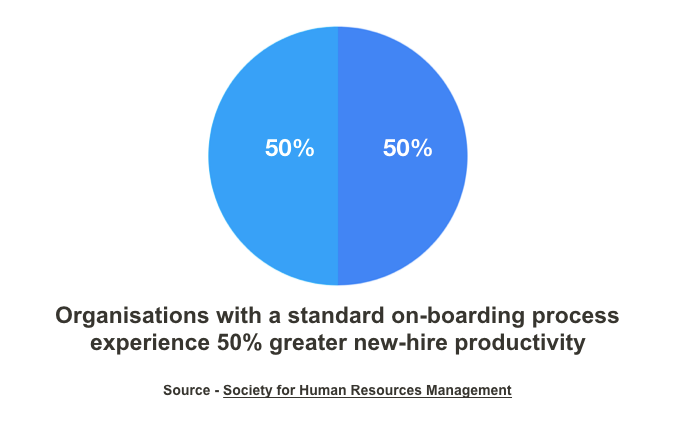The onboarding process can have a dramatic effect on job performance and employee satisfaction. A study conducted by the Aberdeen Group showed that organizations with a standard onboarding process experience 54% greater new hire productivity. When dealing with onboarding remote employees, this process becomes even more important. The combination of long distances, time zones, and cultural differences – in addition to the typical challenges with new starts – means companies are unsure of how to onboard remote employees, bridge the culture gap, and make them feel welcomed and appreciated.
As the experts in building offshore teams, we’d like to think that we’ve mastered this process. This post will share a few tips and tricks which can be used to improve onboarding.
We’ll also explore the significant impact that successful onboarding has on collaboration, employee experience, and productivity.
“Onboarding” starts way before the work does
The most effective onboarding processes, kick off the day a company rolls out its offer. The delay between a job offer and starting work can be anywhere from a few days to several months. Especially in the latter case, it’s imperative that the delay doesn’t fall into negligence.
So what can companies do?
Schedule weekly catch-up calls – even dropping regular emails – to see if there’s anything the new hire needs. Simply being a presence goes a long way to demonstrating investment in new employees. Some companies send small care packages – flowers, some branded goodies, a joke present – to bring a smile to their face. It’s all about keeping new employees warm and feeling like they made the right choice.
If these employees know they can reach out at any time and get a nice response, then the onboarding process is going well.
Cultivating effective teamwork and collaboration
We’ll close the blog with a few tips on boosting the recruitment and onboarding process. For now, let’s look at how onboarding remote employees actually affect teams.
Proper onboarding will always make your employees feel like part of “the family” – even if you don’t phrase it that way. It helps them belong. And when people feel valued at work, they tend to be more invested in their success. The quality of output will be better than a similar employee who feels excluded, unhappy, or simply a little isolated.

Managers should also take time to describe the ethos of the company. Encourage new starts to ask questions or to put their managers off-balance. Make sure they know that being wrong is still a success. (Unless, of course, that doesn’t tie in with your ethos!)
These small efforts can give your employees the confidence to strike up conversations or approach other team members about issues, or new collaborations. Particularly for offshore workers whose colleagues could be 10,000 miles away, onboarding is crucial to getting settled.
We like to assign our new hires a ‘buddy’ – someone who knows the ropes of the business, chats easily and is nice to be around. Having a ‘go-to’ person in a new work environment should help substantially reduce isolation or nerves among new employees.
Click here to know more about the process of onboarding remote employees